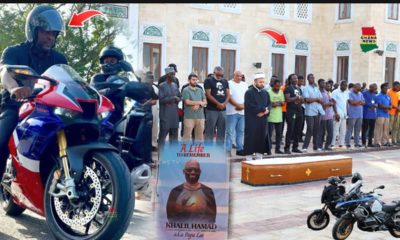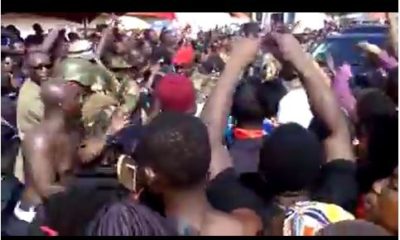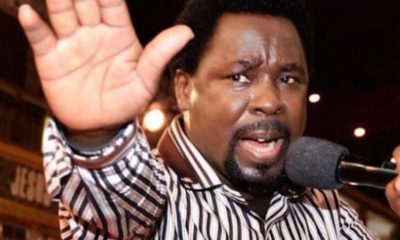Asia
Iraq: At least 23 dead amid fighting after Moqtada al-Sadr quits

At least 23 people have been killed in some of the worst fighting for years in Iraq’s capital, Baghdad, sparked by a key leader’s decision to quit politics.
Gunshots and rocket-fire rang out as supporters of Shia Muslim cleric Moqtada al-Sadr clashed with security forces and militias aligned with Iran.
Mr Sadr has ordered his supporters to withdraw from outside parliament, where they have been protesting for weeks.
Iraq has been in a state of paralysis since inconclusive elections in 2021.
The violence began on Monday after Mr Sadr, one of Iraq’s most influential figures, said he was withdrawing from political life.
His bloc won the most seats in October’s elections but could not agree on the formation of a new government with the second largest bloc, comprised mainly of Iran-backed parties.
Once an Iranian ally, Mr Sadr has repositioned himself as a nationalist wanting to end US and Iranian influence over Iraq’s internal affairs.
The fighting has been taking place between Mr Sadr’s militia, known as the Peace Brigades, militias supported by Iran, and members of the Iraqi security forces.
Much of it has been concentrated around the city’s Green Zone, a heavily fortified area that houses government buildings and foreign embassies. Dutch embassy staff were forced to move to the German mission due to the clashes.
Iran has closed its borders with Iraq in response to the unrest, and Kuwait has urged its citizens to leave the country immediately.
All of those killed were Mr Sadr’s supporters, while some 380 were injured, Iraqi medics said, according to AFP news agency.
A spokesperson for UN Secretary General Antonio Guterres said he was alarmed by events and called for “immediate steps to de-escalate the situation”.
On Tuesday Mr Sadr apologised to the Iraqi people for the violence and instructed his supporters to leave their protests.
“This is not a revolution because it has lost its peaceful character,” he said in a televised address. “The spilling of Iraqi blood is forbidden.”
After he spoke, the army lifted a nationwide curfew which had been imposed on Monday.
Moqtada al-Sadr, 48, has been a dominant figure in Iraqi public and political life for the past two decades.
His Mehdi Army emerged as one of the most powerful militias which fought US and the new Iraqi army in the aftermath of the 2003 invasion which toppled former ruler Saddam Hussein.
He later rebranded it as the Peace Brigades, and it remains one of the biggest militias in the paramilitary Popular Mobilisation Forces.
The deep roots of this crisis lie in the plight of ordinary Iraqis, sick of the sectarianism and endemic corruption that has plagued their politics for two decades. It has increased the political space for those offering radical action and a way out.
The immediate cause is in the growing, violent rivalry between the factions of Iraq’s majority Shia community, vying for control of the country and the state. The deadlocked election result has led to the longest period yet without a government.
Mr Sadr commands millions of followers, hundreds of whom have been camped outside parliament since storming it twice in July and August in protest at the political paralysis.
CLICK HERE TO DOWNOAD PRESS RADIO MOBILE APP

The sight of his supporters jumping into the swimming pool of a government palace on Monday is a reminder of his power to mobilise his base, the growing protests a sign of his reputation for radical action. More worrying is how quickly the violence has escalated in Baghdad, accompanied by a warning from the UN that the survival of the state is at stake.
-

 Lifestyle3 weeks ago
Lifestyle3 weeks agoRoad Safety Authority narrates how buttocks causes road accident
-

 GENERAL NEWS1 month ago
GENERAL NEWS1 month agoWhy 15 police officers stormed Owusu Bempah’s church – Kumchacha narrates
-

 GENERAL NEWS3 weeks ago
GENERAL NEWS3 weeks agoWatch how Ibrahim Mahama rode Honda superbike to pay last respects to late friend
-

 GENERAL NEWS4 weeks ago
GENERAL NEWS4 weeks agoHow Offinso residents storm destooled queen mother’s house, demand for new chief
-

 South Africa News4 weeks ago
South Africa News4 weeks agoWoman thrown out of a speeding taxi while on her way to work
-

 GENERAL NEWS7 days ago
GENERAL NEWS7 days agoDeadly clash between youth and navy personnel results in two deaths at Tema Manhean
-

 SHOWBIZ KONKONSAH1 week ago
SHOWBIZ KONKONSAH1 week agoJunior Pope’s Death: Video of John Dumelo refusing to join canoe for movie shoot over safety concerns resurfaces
-

 News Africa2 months ago
News Africa2 months ago‘Satanically dubious’ – SCOAN releases statement on BBC’s report about TB Joshua, church





